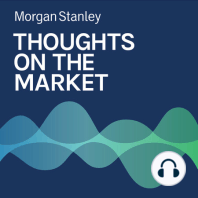4 min listen

Andrew Sheets: The Changing Story of Inflation
Andrew Sheets: The Changing Story of Inflation
ratings:
Length:
3 minutes
Released:
May 27, 2022
Format:
Podcast episode
Description
So far this year's economic story has been dominated by inflation and central bank policy, but as that landscape changes, is it time to shift focus back towards growth?-----Transcript-----Welcome to Thoughts on the Market. I'm Andrew Sheets, Chief Cross-Asset Strategist for Morgan Stanley. Along with my colleagues bringing you a variety of perspectives, I'll be talking about trends across the global investment landscape and how we put those ideas together. It's Friday, May 27th at 2 p.m. in London. 2022 has given investors a lot to chew on. But out of the many developments of this year, one really stands out. It's inflation and the impact that high inflation has had on central bank policy. If you had to pick a defining economic trend in the last 40 years, it was probably the steady moderation of inflation. Then, if you had to pick a defining trend of the last decade, it was the issue of inflation being unusually low, a symptom of weak growth that warranted major central bank support. This year, the story changed. Rising prices started to be driven by strong demand that outstripped available supply, rather than COVID related disruptions. The persistence of these rising prices caught central banks and professional forecasters by surprise. Central bank policy then shifted rapidly, a shift that drove bond yields higher, market valuations lower, and defined much of the market's performance year to date. But now this story may be changing again, away from inflation and back towards growth. After rocketing higher over the first five months of the year, Morgan Stanley's economists do expect U.S. inflation to moderate for the rest of 2022. Some of this is that we're passing the peak rate of change, recall that on a year over year basis, prices today are being compared to May of 2021, a time when the U.S. vaccination rate was still low and activity was a long ways from being back to normal. We're also seeing encouraging signs that some of the worst disruption to supply chains are easing. Fewer ships are sitting off of U.S. ports, unloaded. The cost of freight is declining. Many retailers are now reporting plenty of inventory. And don't just take our word for it. Market based estimates of future inflation have been declining, in both the U.S. and Europe, over the last month. If this trend of moderating inflation can hold, there are some important implications. First, at a very simple but very important level, inflation that is high but falling, is much less frightening to the market than inflation that's high, but rising. This should help reduce the market's fear about a more extreme, 1970's style scenario. Second, it suggests that expectations of future central bank interest rates don't need to rise much further. That, in turn, could help bond yields stabilize, especially in the U.S. And more stable bond yields could help higher quality parts of the fixed income market, like mortgages and municipal bonds, that tend to be very sensitive to that interest rate volatility. The flip side is that as markets focus less on inflation, they will likely focus more on growth, where Morgan Stanley's economists see a sharp deceleration. While short term bounces are possible, we'd like to see more conservative estimates for earnings before assuming that the market's challenges are truly behind it. Thanks for listening. Subscribe to Thoughts on the Market on Apple Podcasts, or wherever you listen, and leave us a review. We'd love to hear from you.
Released:
May 27, 2022
Format:
Podcast episode
Titles in the series (100)
Andrew Sheets: A Second (and Third) Opinion for Equity Markets by Thoughts on the Market